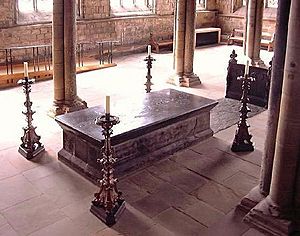Bede's Death Song facts for kids

Bede's Death Song is a short, five-line poem from a very long time ago. It's written in Old English, which is an early form of the English language. People believe these lines were the very last words spoken by a famous monk named the Venerable Bede. This poem is special because it has survived in many old handwritten books, called manuscripts. In fact, it's one of the most common Old English poems found today! You can find it in different old dialects, like Northumbrian and West Saxon.
Who Was Bede?
Bede, also known as the Venerable Bede, was an English monk who lived in the Kingdom of Northumbria (now part of England) during the 7th and 8th centuries. He was a brilliant scholar and writer. Bede wrote many books about history, science, and religion. His most famous work is Ecclesiastical History of the English People. This book tells the story of early Christianity in England. Bede is often called the "Father of English History" because of his important writings. He died in 735 AD.
What Does the Poem Mean?
Bede's Death Song is a short but powerful poem. It talks about thinking about your life before you die. It encourages people to consider what good or bad things they have done. The poem suggests that everyone should think about how their actions will be judged after death. It's a reminder to live a good life.
Here is a modern English translation of the poem:
Before setting forth on that inevitable journey, none is wiser than the man who considers—before his soul departs hence—what good or evil he has done, and what judgement his soul will receive after its passing.
This means that no one is wiser than someone who thinks about their life and what will happen after they die. It's about being prepared for the end of life by living well.
 | Kyle Baker |
 | Joseph Yoakum |
 | Laura Wheeler Waring |
 | Henry Ossawa Tanner |

